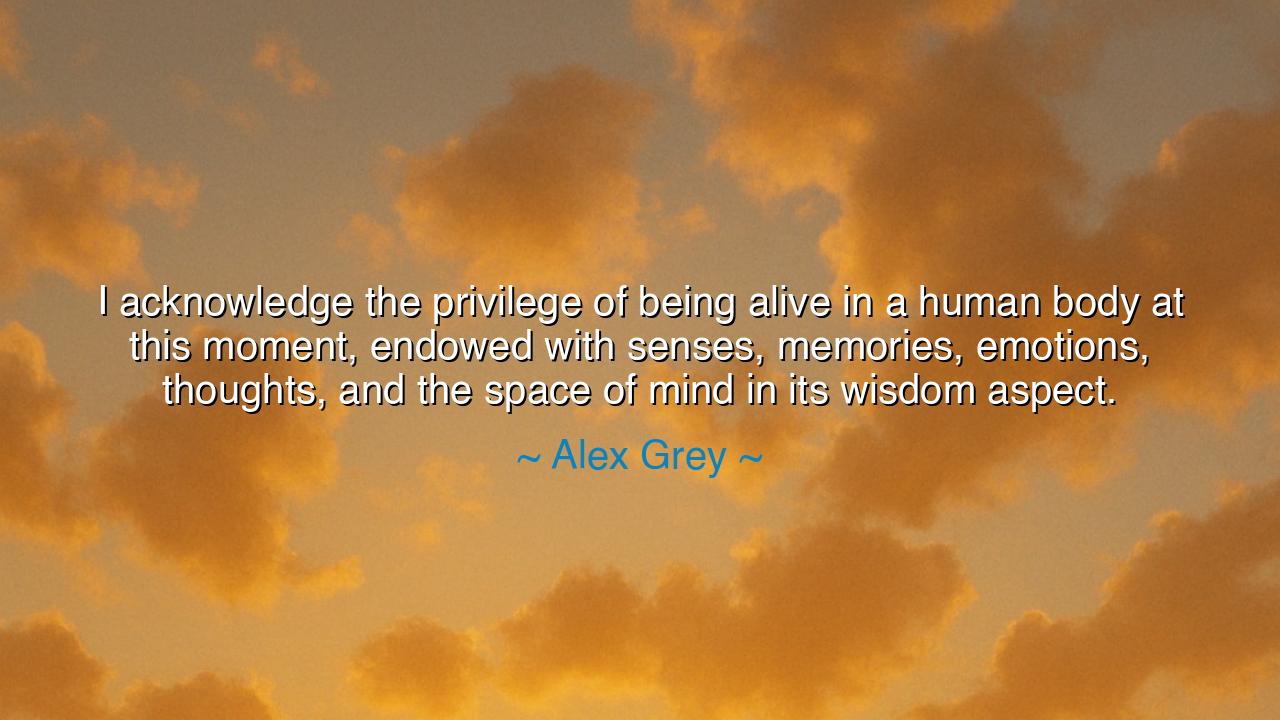
I acknowledge the privilege of being alive in a human body at
I acknowledge the privilege of being alive in a human body at this moment, endowed with senses, memories, emotions, thoughts, and the space of mind in its wisdom aspect.






In the grand tapestry of existence, where the cosmos stretches out in eternal mystery, there is a sacredness to being alive—a profound privilege that is often overlooked in the rush of everyday life. Alex Grey speaks to this profound awareness when he says, "I acknowledge the privilege of being alive in a human body at this moment, endowed with senses, memories, emotions, thoughts, and the space of mind in its wisdom aspect." These words are not mere reflection; they are a call to recognize the gift of our existence, to acknowledge the miracle of the human experience in all its complexity and beauty. For in this moment, we are not mere beings walking through the world—we are living vessels, blessed with the capacity to feel, to think, and to create.
The ancients understood this as well. The Greek philosophers, in their pursuit of knowledge, were acutely aware of the privilege of being alive and conscious in a body that could perceive the world. Socrates famously said, “An unexamined life is not worth living.” This deep awareness of life’s fleeting nature led him and others to embrace the mind as a sacred instrument, capable of perceiving truths beyond the physical world. To be alive, with senses to experience and a mind to reflect, was not just a gift, but a responsibility. It was a call to live with purpose and to honor the vast potential within each human form.
To be endowed with senses—the ability to see, to hear, to taste, to feel—is to be connected to the very fabric of existence. The world is a canvas, and our senses are the brushes that allow us to paint the moments of our lives. Think of Leonardo da Vinci, the master of both art and science, whose keen observation of the world around him was at the heart of his genius. His senses were not mere tools, but windows into the mysteries of nature. Through his eyes, he saw the interconnection of all things, and through his hands, he brought that vision to life in his art. In the same way, Grey’s words urge us to honor the gift of our senses, for they are our means of experiencing the vast world that surrounds us and the deeper world within.
But Grey does not stop there—he speaks also of the memories and emotions that shape us. These intangible aspects of our being are the threads that weave our individual stories, making each human experience unique. The ancients believed that our memories were not just past events to be recalled, but part of a larger cosmic story. The great epic poems, like the Mahabharata and the Aeneid, were written not just to tell the stories of gods and heroes, but to capture the wisdom of past generations. Our memories, too, carry the wisdom of those who came before us. And our emotions, while often seen as fleeting, are the deep rivers through which we experience life’s meaning. Like the ancient poets, we must honor our emotions, for they are the pulse of our soul, guiding us toward a greater understanding of ourselves and the world.
In his reflection, Grey also highlights the space of mind—a vast inner realm that allows for wisdom and clarity. This is the mind’s ability not only to think, but to reflect, to rise above the moment and see the larger picture of existence. The ancients revered the mind for this very reason. Plato taught that true knowledge was not simply the accumulation of facts, but the ability to transcend the physical world and understand the higher forms of truth. The wisdom aspect of mind that Grey speaks of is the sacred space in which we can find peace, understanding, and purpose. It is the part of us that can step back and see the grand design of life, knowing that each thought, each emotion, is part of a greater whole.
But as we reflect on this privilege, let us not forget that it is a temporary gift. Just as the ancients were aware of the brevity of life, so must we be mindful of how we use the time and gifts we are given. The great warrior kings of the past, such as Alexander the Great, understood the fleeting nature of life. Though his empire spanned vast lands, he knew that he could not conquer time itself. His legacy was not in the lands he ruled, but in how he used his life’s brief moments to create something that would endure. Like Alexander, we are called to recognize that our time here is but a fleeting moment in the grand tapestry of existence. The privilege of life calls us not only to celebrate it but to live it with purpose, with awareness, and with a deep understanding that our actions have the power to shape the world for generations to come.
So, let us take Grey’s words to heart: we are alive, endowed with senses, emotions, and thoughts—each one a precious gift. Let us acknowledge the privilege of our existence and honor it by living fully. Whether in moments of joy or sorrow, in reflection or action, let us embrace the sacred opportunity to be conscious, to experience, and to contribute to the ever-unfolding story of life. Through our senses, our emotions, and the wisdom of our minds, we shape our world—and in doing so, we honor the sacred privilege of being alive.






AAdministratorAdministrator
Welcome, honored guests. Please leave a comment, we will respond soon